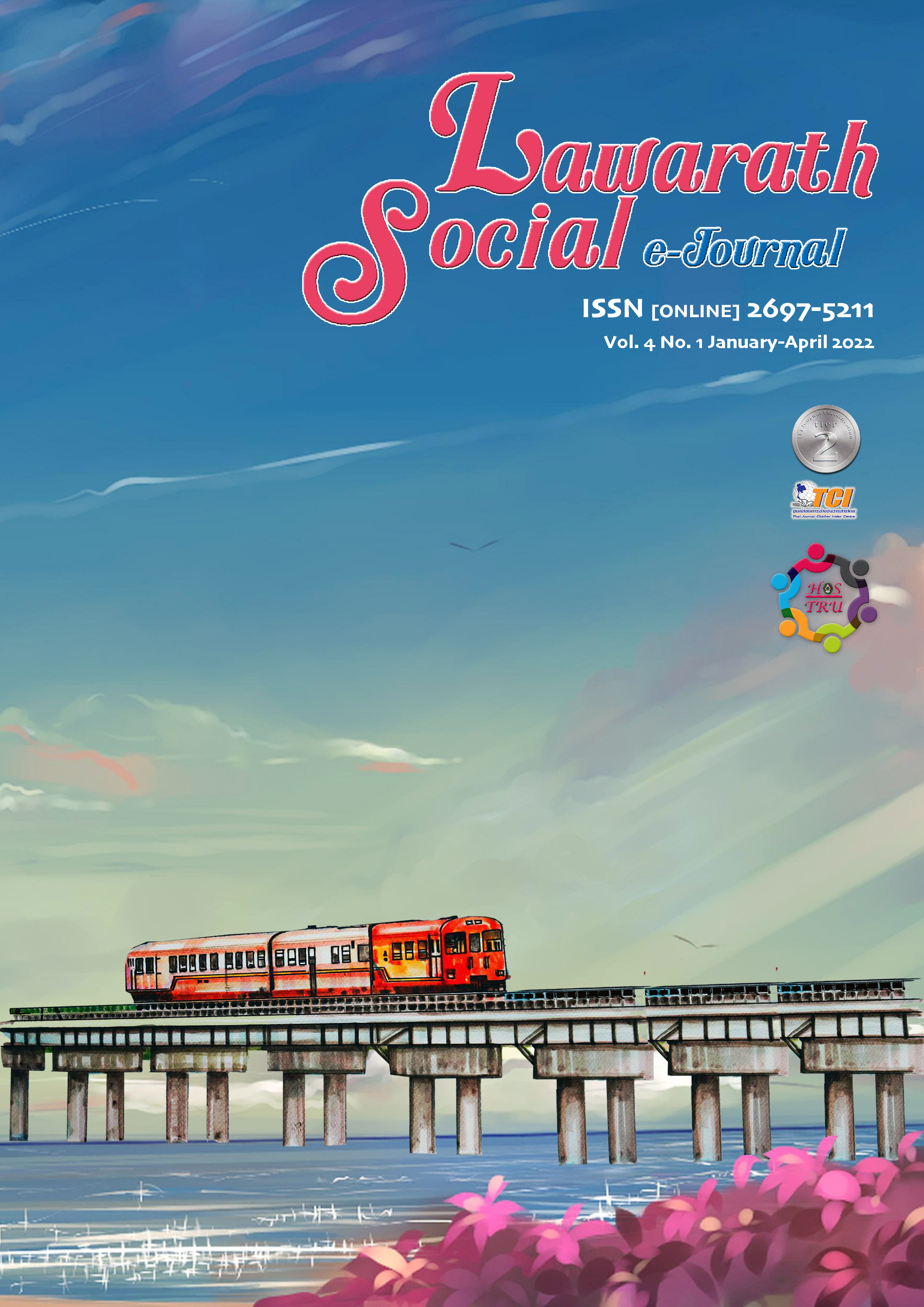A Study of Confucius Concepts on the Dimension of Happiness from the Lun Yu Scriptures
Keywords:
Happiness, P.E.R.M.A Theory, Philosophy of Confucius, Buddhist, LunyuAbstract
“乐le”(happiness) is an important concept that often appears in Lun Yu scriptures. The valuable scriptures recorded conversation between Confucius and his disciples. The study aims to analyze Confucius's concept of happiness portrayed in the Lun Yu Scriptures which included: 1. Confucius's concept of happiness; 2. The relationship between Confucius' happiness patterns and the elements of happiness in P.E.R.M.A which is the theory that discusses the concept of improving human happiness and well-being and 3. The relationship between Confucius' happiness and Buddhist principles. The study studied the Lun Yu scriptures in both Chinese and Thai versions. The results showed that: 1. Confucius’ dimensions of happiness were divided into four types which were the pleasure of learning, the joy of friendship and forgiveness, the moral happiness, and the elation of solitude; 2. According to the P.E.R.M.A theory, it was found that all the happiness patterns of Confucius consisted of positive emotion as the main component and 3. From the analysis of the relationship between Confucius' happiness and Buddhist principles, it found that the pleasure of learning was related with the four Iddhippada principle. The joy of friendship and forgiveness was related with the four Brahmavihra of mind principle. The moral happiness was related with the seven Sappurisa-Dhammas principle and the four Brahmavihra of mind principle. The elation of solitude was related with the seven Sappurisa-Dhammas principle in knowing oneself and moderation. It could be concluded that Confucius praised the happiness of moral as a basic for living. He perceived the joy of using wisdom should contain a solitude. The joy of building relationships and forgiving is related to Buddhist principles, and the elements contributed to sustainable happiness are all consistent to the positive psychology.
Downloads
References
กองบรรณาธิการ. (2563, มกราคม). สุขในงาน เบิกบานในชีวิต เรียนรู้การทำงานอย่างมีความสุขด้วยหลักธรรม. วารสาร HR Society Magazine, 18(205), สืบค้น พฤศจิกายน 24, 2564 จาก https://bit.ly/3p4xuic.
เกสร มุ้ยจีน. (2559, ตุลาคม-ธันวาคม). การสร้างความสุขด้วยจิตวิทยาเชิงบวก. วารสารวิทยาศาสตร์และเทคโนโลยี, 24(4), 673-681.
ญาณาธิป เตชะวิเศษ. (2558, ตุลาคม). ความหมายของ “ขบวนการขงจื๊อสมัยใหม่” The Meaning of New Confucianiam 现代新儒家的概念. วารสารจีนศึกษา มหาวิทยาลัยเกษตรศาสตร์, 8(2), 245-269.
ตนุภัทร โลหะพงศธร, และณัฐมน สุนทรมีเสถียร. (2021). ความสุขสร้างได้ เปลี่ยนชีวิตให้สุขใจอย่างยั่งยืน ด้วยจิตวิทยาเชิงบวกและแบบจำลอง PERMA. สืบค้น พฤศจิกายน 24, 2564. จาก https://bit.ly/3HLEI3r.
ทองแถม นาถจำนง, และปกรณ์ ลิมปนุสรณ์. (2551). ธรรมะขงจื๊อ: สอนคนให้เป็นคน. กรุงเทพฯ: ใบบัว.
นฤมล ราชบุรี. (2557, พฤษภาคม-สิงหาคม). สัปปุริสธรรม ๗: แนวคิดเชิงบูรณาการเพื่อการพัฒนาคุณภาพการศึกษาอย่างยั่งยืน. วารสารครุศาสตร์ปริทรรศน์ฯ, 1(1), 185-196.
พระภัทธชาพงษ์ สิริภัทโท (ก่ำชัยภูมิ), พระสมพร ออนไธสง, และพระครูสุตภัทรธรรม (นนทชาติ เนื่องกระโทก). (2564, มกราคม-มีนาคม). ความสำคัญของการนําหลักธรรมในพระพุทธศาสนาไปประยุกต์ใช้ในชีวิตประจำวัน. วารสารสังคมศาสตร์เพื่อการพัฒนาท้องถิ่น, 5(1), 279-286.
พระมหาวิเชียร สุธีโร. (2562, มกราคม-มิถุนายน). ความสุขในทัศนะของพระพุทธศาสนา. วารสารพุทธมัคค์ ศูนย์วิจัยธรรมศึกษา สำนักเรียนวัดอาวุธวิกสิตาราม, 4(1), 42-47.
พระมหาวีรยุทธ กุสลจิตฺโต, และพระมหามิตร ฐิตปญฺโญ. (2564, มกราคม-เมษายน). สันโดษ คือ องค์ธรรมแห่งการรู้จักพอ. Journal of Buddhist Education and Research: JBER, 7(1), 276-288.
สุดารัตน์ ตันติวิวัทน์. (2560, มกราคม). จิตวิทยาเชิงบวก: การพัฒนา การประยุกต์ และความท้าทาย. วารสารพฤติกรรมศาสตร์เพื่อการพัฒนา, 9(1), 277-290.
สุพรรณี ไชยอําพร, และคมพล สุวรรณกูฏ. (2550, ตุลาคม). การสังเคราะห์ความสุขของมนุษย์ตามแนวคิดตะวันตก-ตะวันออกเพื่อการพัฒนาดัชนีชี้วัด. วารสารพัฒนาสังคม, 9(1), 118-156.
สุวรรณา สถาอานันท์. (2551). หลุนอี่ว์: ขงจื่อสนทนา. กรุงเทพฯ: บริษัท เอเซียแปซิฟิคพริ้นติ้ง จำกัด.
_______ (2562). หลุนอี่ว์: ขงจื่อสนทนา. กรุงเทพฯ: Openbooks.
สุวัฒน์ ทาสุคนธ์. (2559, มกราคม-มิถุนายน). ความคิดของขงจื่อเพื่อสังคมที่เป็นสุข. วารสารรามคำแหง ฉบับมนุษยศาสตร์, 35(1), 65-88.
เสถียร โพธินันทะ. (2544). เมธีตะวันออก. กรุงเทพฯ: สร้างสรรค์บุ๊คส์.
อมร ทองสุก. (2552). คัมภีร์หลุนอวี่ The Analects of Confucius คัมภีร์แห่งแดนมังกร (พิมพ์ครั้งที่ 2). ปทุมธานี: ชุณหวัตร.
อรพินทร์ ชูชม. (2559). โครงสร้างของความสุขและสุขภาวะในจิตวิทยาเชิงบวก. วารสารจิตวิทยา มหาวิทยาลัยเกษมบัณฑิต, 6(2), 1-7.
อันธิฌา แสงชัย. (2557). มิติสุนทรียศาสตร์ในจริยศาสตร์ขงจื่อ. วิทยานิพนธ์ปริญญาดุษฎีบัณฑิต จุฬาลงกรณ์มหาวิทยาลัย.
Hill, Andy, &Together, Autism. (2020). The PERMA Model: A Scientific Theory of Happiness. Retrieved November 24, 2564 from https://bit.ly/3r7kf3a.
Jin, Yu. (2013). Confucius’s Idea of Happiness and Its Revelation for Contemporary College Students. Master thesis North China Electric Power University, China.
Li, Jinze. (2015, November). Confucius’ View of Happiness and Its Contemporary Value. Journal of Nanyang Normal University (Social Sciences), 14(11), 8-11.
Li, Zehou. (2004). Reading the Analects Today. (3rd ed.). Beijing: Longchang Weiye.
Liu, Qun. (2016). The analects of Confucius “music” in the aesthetic connotation analysis. Master thesis, Qinghai Normal University, China.
Zhu, Changliu. (2008, October). Confucius’ View of Happiness. Journal of Anqing Teachers College (Social Science Edition), 27(10), 42-44.
Downloads
Published
How to Cite
Issue
Section
License

This work is licensed under a Creative Commons Attribution-NonCommercial-NoDerivatives 4.0 International License.



